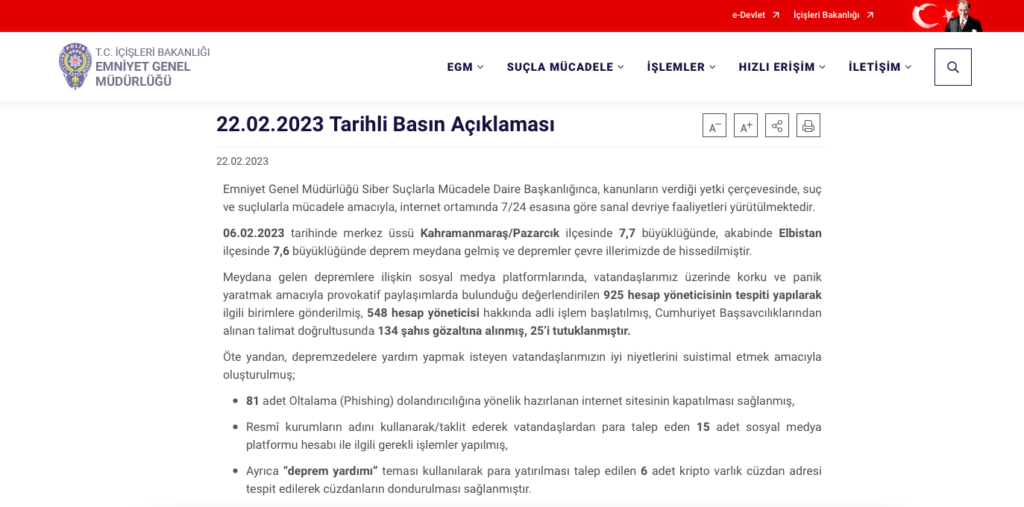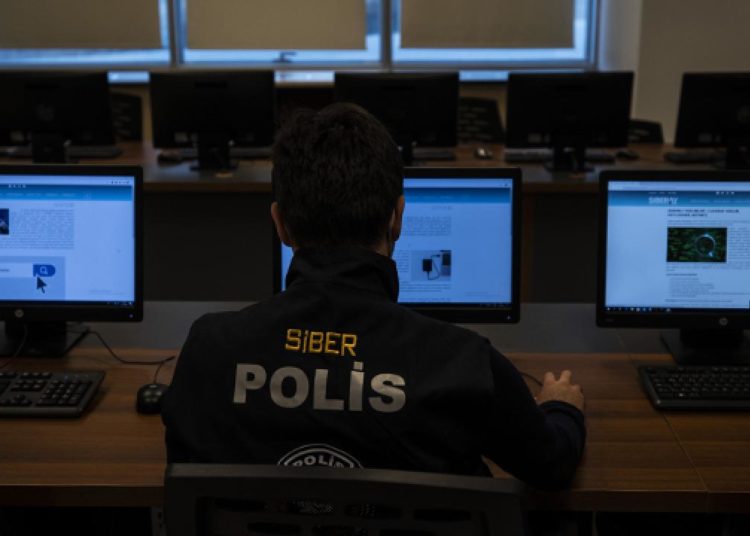Levent Kenez /Stockholm
Turkish police continue to go after people it claims to have shared “provocative” posts on social media after twin earthquakes devastated southern Turkey on February 6, killing more than 43,000 people according to the latest official figures.
According to statements issued by Security General Directorate and updated daily, 925 social media users who were accused of creating fear and panic in society were identified, and judicial proceedings were initiated against 548 of them. One hundred thirty-four persons were detained and 25 arrested by chief public prosecutor’s offices across the country.
On February 8, the Information and Communication Technologies Authority (BTK) imposed a ban on Twitter and TikTok by order of the government. The nine-and-a-half-hour block on Twitter, the platform where people still under the rubble shared their location information and where aid activities were organized, garnered a strong reaction. The government lifted the ban after the backlash.

Fatih Sayan, deputy transportation minister, tweeted that access was blocked and that he had a meeting with Twitter officials. ”Our demands are clear: strong cooperation on disinformation and false reports and rapid reaction to fake accounts and sensitive images of victims,” he said.
Sayan said Twitter would take “action” more quickly in the face of Turkey’s demands.
Twitter CEO Elon Musk on February 9 also shared with his followers that the Turkish government had informed the company that access to Twitter would soon be restored.
The Turkish government has also blocked access to Ekşi Sözlük, one of the country’s most popular social media websites, its latest move against platforms that it accuses of spreading disinformation.
Ekşi Sözlük representatives said yesterday they had met with BTK officials but that no content was shown as a basis for the decision to block access.
According to Ekşi Sözlük, the complainant who applied to the court for the blocking of the platform was the Turkish Presidency.
It was claimed in the court decision that “especially after the earthquake, false information was given about the military and state institutions; there were attempts to manipulate the society; the state was portrayed as helpless; and the site administrators did not show the necessary reaction to incorrect and slanderous articles.”
Ekşi Sözlük management was also accused of failing to prevent the posting of harmful comments.
Nordic Monitor previously reported that the government of President Recep Tayyip Erdoğan planned to increase its control over news websites and social media with new legislation that entered into force on October 14, 2022. The law was aimed at combatting disinformation, and extensive censorship was also introduced regarding the operations of Turkish intelligence agency MİT.
With new articles added to the Turkish Penal Code, the crime of “publicly disseminating misleading information” is explained for the first time. A person who spreads disinformation is defined as “a person who publicly disseminates false information about the internal or external security, public order or general health of the country in a way that can disturb the public peace, with the sole aim of creating anxiety, fear or panic among the society. Those who are convicted of this crime will be sentenced to imprisonment of between one and three years. If the accused hides it or commits it within the framework of terrorist organization activity, the penalty will be increased by half.”
Within the scope of an obligation for foreign social media platforms to have a representative in Turkey, it will no longer be sufficient for the representative to be a Turkish citizen only; the representative will need to reside in Turkey. If the daily access from Turkey is more than 10 million, the legal representative is supposed to be fully authorized and responsible for technical, administrative, legal and financial issues before the law.
With the new legislation, the distinction between the commission of a crime in Turkey and abroad has been removed in order to more effectively combat offenses that require arrest.
Meanwhile, the Radio and Television Supreme Council (RTÜK) yesterday imposed fines and broadcasting bans on Halk TV, Tele1 and Fox TV for their coverage after the earthquake.












